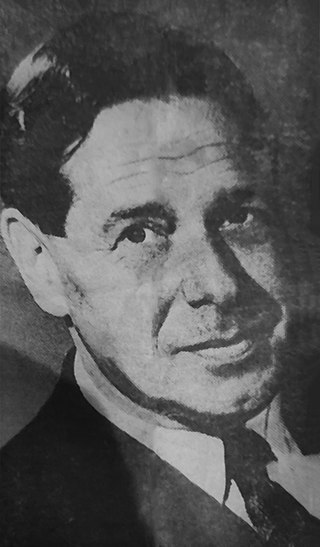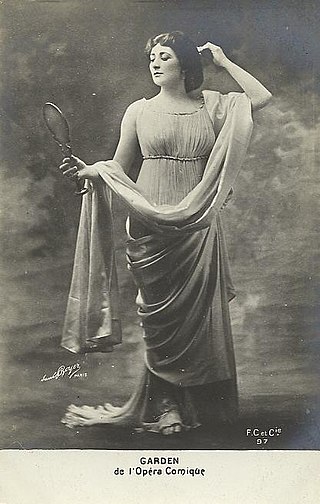Related Research Articles
Ronald Binge was a British composer and arranger of light music. He arranged many of Mantovani's most famous pieces before composing his own music, which included Elizabethan Serenade and "Sailing By".

Sir James Loy MacMillan, is a Catholic Scottish classical composer and conductor.
Steven George McNeil Osborne is a Scottish pianist who has performed concertos and solo recitals worldwide.
Thomas Wilson CBE FRSE was an American-born Scottish composer, a key figure in the revival of interest in Scottish classical music after the second world war.
Sir Alexander Drummond Gibson was a Scottish conductor and opera intendant. He was also well known for his service to the BBC and his achievements during his reign as the longest serving principal conductor of the Scottish National Orchestra in which the orchestra was awarded its Royal Patronage.
Edward ("Eddie") McGuire is a Scottish composer whose work ranges from compositions for solo instruments and voice to large-scale orchestral and operatic works. McGuire studied composition with James Iliff at the Royal Academy of Music in London from 1966 to 1970 and then with Ingvar Lidholm in Stockholm in 1971.

Arthur Leslie Benjamin was an Australian composer, pianist, conductor and teacher. He is best known as the composer of Jamaican Rumba (1938) and of the Storm Clouds Cantata, featured in both versions of the Alfred Hitchcock film The Man who Knew Too Much, in 1934 and 1956.
Robert Kemsley (Robin) Orr was a Scottish organist and composer.
Sarah Frances Beamish is a British composer and violist. Her works include chamber, vocal, choral and orchestral music. She has also worked in the field of music, theatre, film and television, as well as composing for children and for her local community.

St John's Town of Dalry, usually referred to simply as Dalry, is a village in Dumfries and Galloway, Scotland, in the historic county of Kirkcudbrightshire.
Robert Kemp (1908–1967) was a Scottish playwright. Along with Tom Fleming and Lennox Milne, he was a founder of the Edinburgh Gateway Company.
William Brocklesby Wordsworth was an English composer. His works, which number over 100, were tonal and romantic in style in the widest sense and include eight symphonies and six string quartets.
Murray Dickie OBE was a Scottish tenor opera singer and director, who established his career in England, Austria and Italy during the 1950s. In addition to his extensive stage work he was a prolific recording artist.

Arthur William Oldham OBE was an English composer and choirmaster. He founded the Edinburgh Festival Chorus in 1965, the Chorus of the Orchestre de Paris in 1975, and the Concertgebouw Orchestra Chorus in Amsterdam in 1979. He also worked with the Scottish Opera Chorus 1966–74 and directed the London Symphony Chorus 1969–76. For his work with the LSO Chorus, he won three Grammy Awards. He was also a composer, mainly of religious works, but also a ballet and an opera.

Kenneth Leighton was a British composer and pianist. His compositions include church and choral music, pieces for piano, organ, cello, oboe and other instruments, chamber music, concertos, symphonies, and an opera. He had various academic appointments in the Universities of Leeds, Oxford and, primarily, Edinburgh.
Guy Douglas Hamilton Warrack was a Scottish composer, music educator and conductor. He was the son of John Warrack of the Leith steamship company, John Warrack & Co., founded by Guy's grandfather, also called John.
Prof Ian Naismith Sneddon FRS FRSE FIMA OBE was a Scottish mathematician who worked on analysis and applied mathematics.
Feargus Hetherington is a violinist and violist based in Glasgow. He has performed from an early age throughout Scotland and abroad. He arranges music, teaches and presents music workshops and seminars.

Classical music in Scotland is all art music in the Western European classical tradition, between its introduction in the eighteenth century until the present day. The development of a distinct tradition of art music in Scotland was limited by the impact of the Scottish Reformation on ecclesiastical music from the sixteenth century. Concerts, largely composed of "Scottish airs", developed in the seventeenth century and classical instruments were introduced to the country. Music in Edinburgh prospered through the patronage of figures including Sir John Clerk of Penicuik. The Italian style of classical music was probably first brought to Scotland by the cellist and composer Lorenzo Bocchi, who travelled to Scotland in the 1720s. The Musical Society of Edinburgh was incorporated in 1728. Several Italian musicians were active in the capital in this period and there are several known Scottish composers in the classical style, including Thomas Erskine, 6th Earl of Kellie, the first Scot known to have produced a symphony.
John Davie ("Dock") Mathieson was a Scottish musician. In between his early and late careers as a teacher, he was a musical director for British films in the 1940s and 1950s. He was instrumental in securing Ralph Vaughan Williams's score for the 1948 film Scott of the Antarctic, which the composer later reworked as the Sinfonia antartica. Other films on which Mathieson worked included The Lavender Hill Mob (1951), The Titfield Thunderbolt (1953) and The Ladykillers (1955).
References
- ↑ Alan Munro. Remembering Cedric Thorpe Davie , biography at Toccata Classics (2018)
- 1 2 "Cedric Thorpe Davie | University of St Andrews". Archived from the original on 30 June 2016. Retrieved 25 January 2016.
- 1 2 "Catalogue of works" (PDF). Archived from the original (PDF) on 4 March 2016. Retrieved 25 January 2016.
- 1 2 3 "Former Fellows of the Royal Society of Edinburgh" (PDF). Archived from the original (PDF) on 24 January 2013. Retrieved 25 January 2016.
- 1 2 "Guide to the Papers of Cedric Thorpe Davie". Archived from the original on 31 January 2016. Retrieved 25 January 2016.
- ↑ John France. 'The 1945 Victory Symphony Contest in the Daily Express', in British Classical Music, 18 September 2016
- ↑ The Daily Telegraph : obituaries: McKellar, 11 April 2010
- ↑ Elder, Michael (2003), What do You do During the Day?, Eldon Productions, p. 83, ISBN 9-780954-556808
- ↑ Roy Dyckhoff (10 August 2010). "Cedric Thorpe Davie". Scottishcomposers.wordpress.com. Retrieved 7 August 2020.
- ↑ "Papers of Cedric Thorpe Davie - Archives Hub". Archiveshub.jisc.ac.uk. Retrieved 7 August 2020.
- ↑ The Land of Mountain and Flood: Scottish Orchestral Music , ASV CD WHL2123 (2000)